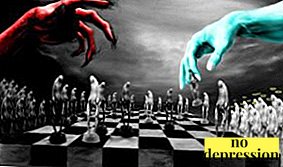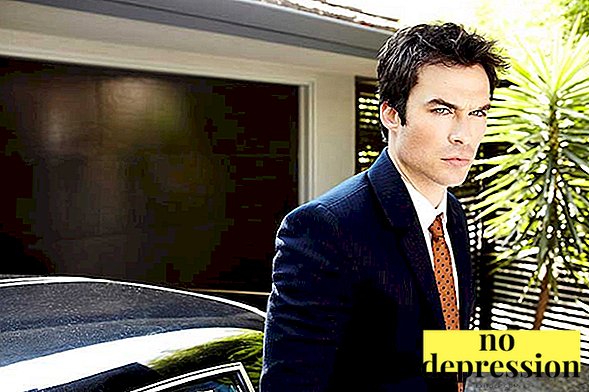Worldview - This is a complex structure that includes many elements.
Having understood this concept in detail, you can correct your own attitude to reality and change your personal behavioral strategy.
Definition of concepts

A worldview is a system of attitudes, evaluations, principles, norms, ideals and orientations that are formed on the basis of knowledge and experience, and then determine a person’s behavior and attitude to reality.
Worldview includes:
- frame of reference;
- perception (identification) of one’s own “I”;
- life position (the principle of knowledge of the world and how to apply this knowledge, that is, behavior).
The worldview is a set of attitudes and beliefs that apply to a certain category (politics, religion, morality, ideas about family life, professional activity, etc.).
What types of science distinguishes?
The main types of outlook in science (classic approach):
- mythological type;
- religious type;
- Philosophy type;
- scientific type;
- ordinary (everyday) type.

Mythological worldview based on images and fantastic perception of the world.
Myths deny a reasonable explanation of reality and rely on the emotional spectrum.
Lack of experience prompted mankind to put forward various assumptions and take them on faith, without taking into account the causal relationships. Myths are not knowledge, but an artificially formed reality in which a person lives.
Religious worldview puts in the head a supernatural being or force that controls all the processes in the world.
And if myths are only an addition to reality (a substitute reality), then religion dictates its norms and rules from the standpoint of morality (bad and good behavior), and also requires strict observance of dogmas from a person.
Philosophical worldview built on logic and trying to explain the world from the standpoint of reason. This type is characterized by consistency, the creation of categories and subcategories, generalization.
At the same time, philosophy allows for a free interpretation of ideas, if at the same time a person adheres to evidence and logic, ignoring emotions and feelings.
Ordinary worldview formed through the accumulation and multiplication of everyday experience. This type of worldview is formed spontaneously, through error analysis and personal practice.

Scientific worldview - this is the desire for a holistic picture of the world and accurate knowledge.
The results of human knowledge are summarized and verified in practice.
From a historical point of view, there are three basic types: mythological, religious and philosophical.
Modern classification allows for a more free interpretation, including optimistic, pessimistic, atheistic, progressive, reactionary, political, hedonistic, and other types of worldview.
The main types and their brief description: table
What is the worldview? Worldview functions most fully reflect the essence of various ideological types. About functions briefly in the table:
Worldview type | Functions |
Scientific |
|
Religious |
|
Mythological |
|
Philosophical |
|
Ordinary |
|
How to change your worldview?

Worldview has two levels:
- sensual or empirical level (attitude, world perception, worldview, world perception);
- conceptual or theoretical (worldview)
The easiest way to change the worldview is by working on a theoretical level, since he is attached to intellectual perception. Those. working with the intellect, shaping and introducing new installations, progress can be made.
- Define your worldview. Everyone has an idea of how this world was formed. What version are you inclined to? Do you think that the Creator had a hand in creating our reality? Or can you take the big bang as a point of reference?
- Find arguments. After you decide on the type of your worldview, try to prove this point of view.
Perhaps, after a while, it will begin to seem that the arguments in the arsenal are not as strong as it seemed before.
- Study. Start exploring the world with the help of science and your own analysis, reflection, inference. Connect experiments to this process. Systematization and deepening of the information available in the head will open the way to other types of outlook and help you choose the most “close” type.
- Who am I? View yourself as a part of society and a huge, interconnected system. Determine your place and purpose in this society (system). Determine your "weight" and "contribution".
- Ask "top" questions. Reflecting on the meaning of life, the laws of the universe and other global things, a person automatically begins to think in large categories and systematize all the components of his life. This allows an objective assessment of reality.
- Give up on experience. It sounds rather strange, but in terms of working with a world view, it is extremely effective to abandon personal experience. After all, if a person has been betrayed several times by friends, he forms a stable conviction about friendship. And this project he projects on all his friends and acquaintances.
Negative experience, as well as positive, forms our worldview. Such hidden installations make it difficult to take a step towards change.
But if you understand that each case is a private one, you can make progress. After all, before you simply coincided the forms of particular cases, and the pattern was not confirmed.
- Summon feelings for a serious conversation. The empirical level of ideology is often associated with false ideas about reality.
 We fear, suffer, love, believe, hope and form against the background of all this erroneous conclusions, which should soothe, reassure, protect, etc. It is necessary to raise "from the bottom" all the conclusions and installations that prevent to go forward. After that, pulling the strings (after analyzing the sensual nature of attitudes), it is necessary to find the prerequisites and work them out.
We fear, suffer, love, believe, hope and form against the background of all this erroneous conclusions, which should soothe, reassure, protect, etc. It is necessary to raise "from the bottom" all the conclusions and installations that prevent to go forward. After that, pulling the strings (after analyzing the sensual nature of attitudes), it is necessary to find the prerequisites and work them out. - The rule of presence. The past and the future do not exist. There is only the present moment. And in a second, not the future will come again, but the present. Therefore, we must live, think and feel "here and now", not plunging into the memories of the past or fantasies about the future.
Otherwise, the perception of reality is distorted, because the brain accepts our fantasies and memories as a replacement reality, based on which it draws conclusions.
- Give up dependence in any form. In order to work on a world view, we must abandon attachments. It is important to perceive yourself as a person or “basis.” You owe nothing to anyone, but nobody owes you anything either. It is not necessary to comply with other people's ideas and desires.
 Only by throwing off the veil of opinion imposed from outside, you can change your own worldview. Otherwise, it will not be possible to find the reasons for certain behavioral strategies, because they are not in your head, but in the head of a neighbor who accidentally inspired this idea to you.
Only by throwing off the veil of opinion imposed from outside, you can change your own worldview. Otherwise, it will not be possible to find the reasons for certain behavioral strategies, because they are not in your head, but in the head of a neighbor who accidentally inspired this idea to you. - The multiplicity of landmarks. In the real world there is no clear boundary separating good and evil. There are many halftones, gray and colorless actions / deeds / thoughts. Specific moral norms are formed in a particular social group and are based on basic guidelines adopted in society. If you “disperse” your thought strictly within this framework, you will not be able to change the worldview.
After all, the norms existing inside your environment will stop mental activity on the borders of "good" and "evil."
- "Many-sided" approach. Explain your actions or events taking place around from the perspective of philosophy, science, religion, life, etc. The more points of view you “try on” to the situation, the sooner your “I” will begin to resonate with respect to one of them.

Changing worldview is not that difficult., as it seems. But for this it is necessary to work, to search for answers within oneself and in accessible sources of knowledge (carefully collected and generalized by previous generations of knowledge).

Personal experience also plays a big role.
Therefore, it is worthwhile to go along this path to the touch, using the existing types and forms of worldviews as a beacon or torch, but not ideal and sample to copy.
In the real world is not found pure types of worldview.
but one of them certainly prevails over the restby programming a person to a specific behavior.
Knowing how to recognize and analyze types of worldview, one can solve many everyday and global problems.
The concept and types of worldview:

 We fear, suffer, love, believe, hope and form against the background of all this erroneous conclusions, which should soothe, reassure, protect, etc. It is necessary to raise "from the bottom" all the conclusions and installations that prevent to go forward. After that, pulling the strings (after analyzing the sensual nature of attitudes), it is necessary to find the prerequisites and work them out.
We fear, suffer, love, believe, hope and form against the background of all this erroneous conclusions, which should soothe, reassure, protect, etc. It is necessary to raise "from the bottom" all the conclusions and installations that prevent to go forward. After that, pulling the strings (after analyzing the sensual nature of attitudes), it is necessary to find the prerequisites and work them out. Only by throwing off the veil of opinion imposed from outside, you can change your own worldview. Otherwise, it will not be possible to find the reasons for certain behavioral strategies, because they are not in your head, but in the head of a neighbor who accidentally inspired this idea to you.
Only by throwing off the veil of opinion imposed from outside, you can change your own worldview. Otherwise, it will not be possible to find the reasons for certain behavioral strategies, because they are not in your head, but in the head of a neighbor who accidentally inspired this idea to you.

